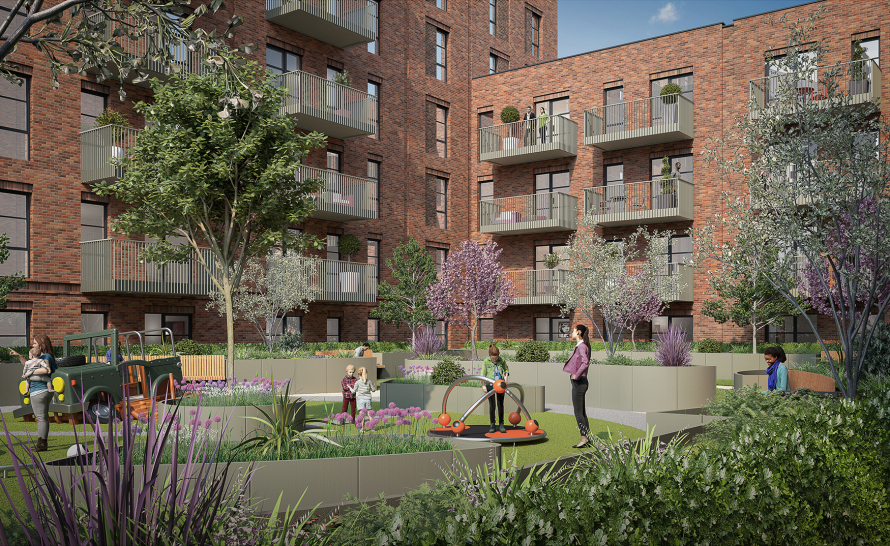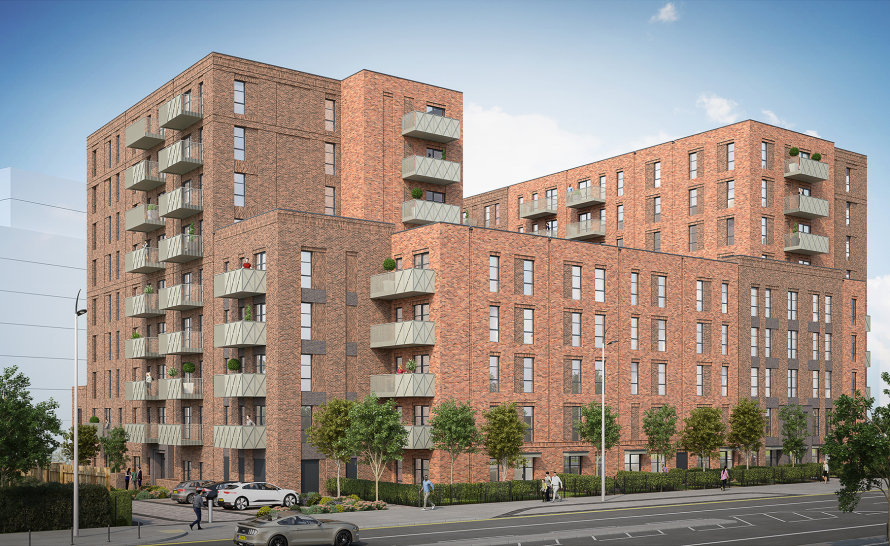Located in Dagenham, east London, the Transport House development will be overseen by housing developer Hollybrook Limited, which will work in partnership to deliver a 149-unit residential space along New Road. This regeneration falls within the London Riverside Opportunity Area (LROA) which seeks to promote the development of under utilised brownfield sites in the boroughs of Barking & Dagenham and Havering for residential and industrial uses. Transport House is one of several developments in the area designed to provide much-needed housing, schools and commercial facilities for London’s swelling population.
Sustainability at the heart
Key principles of the Transport House development are good quality housing, green spaces, pedestrian links and sustainability. The development will be designed to celebrate Dagenham’s industrial heritage whilst providing important connections and housing for the growing community.
In terms of housing, Transport House will feature a mix of one, two, three and four bedroom accommodation, with 50% of the housing affordable and family housing positioned more sensitively.
Private front gardens will be available, with a podium garden for residents to use and green roofs on all upper floors. A new pedestrian link will also connect the development with key heritage areas, making for a scenic walking experience for occupants and visitors.
A fundamental part of the Transport House development is its sustainability. Good, energy-efficient design can help mitigate the effects of climate change. It’s why the development will provide a reduction in carbon emissions through providing cleaner energy, and will responsibly source materials. It will also create spaces that are healthy, economically viable and futureproof for the next generations.
Whitecode’s service
With extensive experience in the residential sector and ample expertise in sustainability, Whitecode was the perfect fit for this development. Whitecode was appointed to provide a sustainability report to highlight how Transport House will meet the requirements of national and regional planning authorities – in particular the London Plan – and Part L Building Regulations, so Transport House can perform efficiently into the future.
Whitecode’s sustainability report covered various areas including energy use, transport, materials, waste, recycling and pollution. Notable findings from Whitecode’s report showed that the development can achieve a 49% improvement over Part L 2013 of the Building Regulations, with 22% of this achieved through the implementation of fabric-first design.
A Home Quality Mark pre-assessment was also completed to demonstrate how, through compliance with the rigorous assessment methodology, the relevant national and planning policies will be met. A minimum HQM score of 47% is expected, translating to a 3.5 Star HQM Rating being achieved.
Transport House will also adopt a circular economy approach. The development’s circular economy sets out measures for reducing waste, that will result in reduced material demands and, enable building materials, components, and products to be disassembled and re-used at the end of their useful life. These measures include:
• Use of prefabricated and modular elements to move the production offsite
• Designing for disassembly by avoiding the use of permanent fixings where possible
• Setting targets for reuse/recycling/recovery of construction and demolition waste
Adopting this approach will ensure that materials are retained in use at their highest value for as long as possible and are then reused or recycled, leaving a minimum of residual waste. This will help reduce the development’s carbon emissions. What’s more, a whole lifecycle carbon assessment for the development will be carried out to identify optimal solutions to reduce overall environmental impacts arising from construction and building operation.
Whitecode was delighted to be appointed to this project, which will regenerate this area of Dagenham and provide energy-efficient, sustainable housing that is fit for the future.


